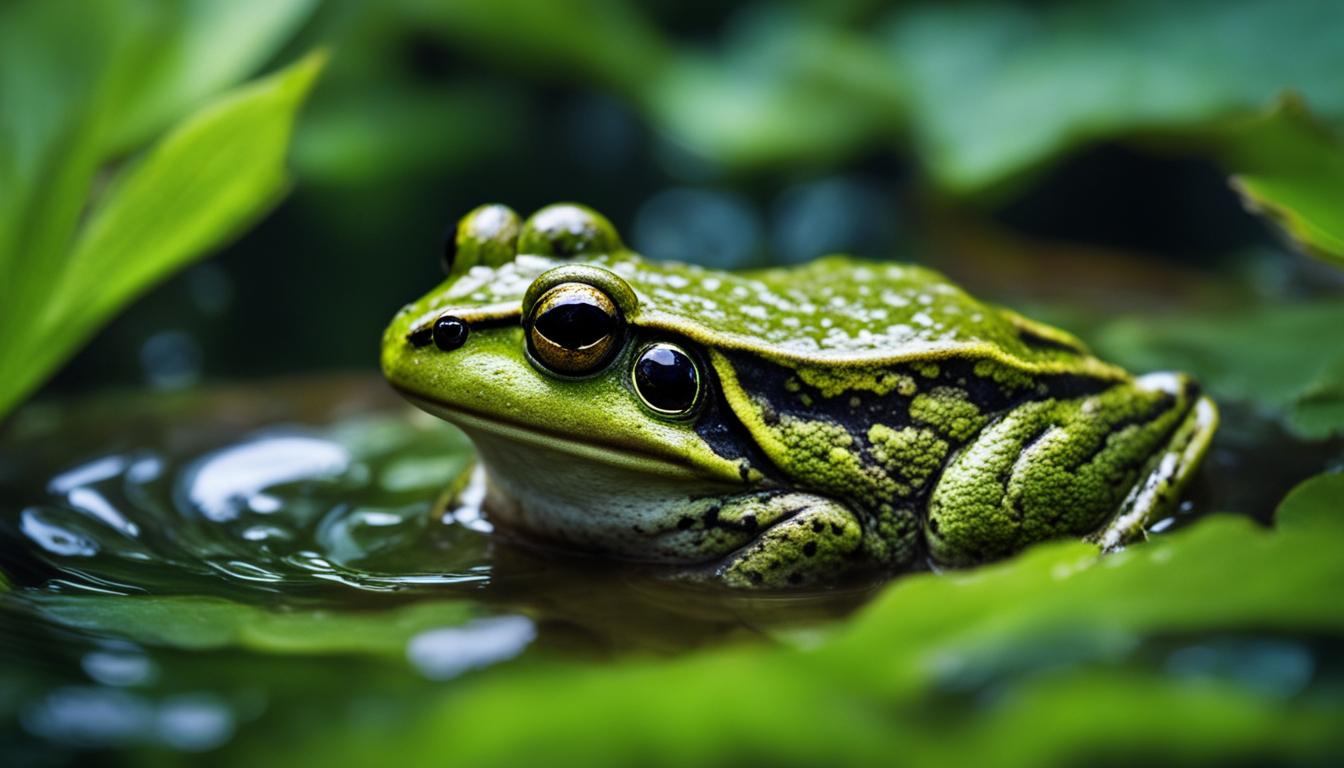Originally posted on January 24, 2024 @ 8:11 am
Have you ever spotted a frog in your house and wondered if it’s a sign of good luck? Well, you’re not alone! Across cultures, frogs have been associated with symbols of luck, success, and abundance. Their presence can carry deep spiritual meaning and signify positive change in your life.
In fables, myths, and folklore, frogs have long been linked to transformation, rebirth, and fertility. They symbolize resilience, determination, and creativity, encouraging you to let go of negativity and embrace change. Many cultures believe that seeing a frog is an auspicious omen that will attract good luck to your doorstep.
But what does frog symbolism mean in different cultures? How do frogs hold significance? Let’s explore the diverse meanings and beliefs surrounding these amphibious creatures, and discover the spiritual depth that lies behind their presence in your home.
Key Takeaways:
- A frog in your house can be a positive sign of good luck, success, and abundance.
- Frogs symbolize transformation, rebirth, and fertility in various cultures.
- They represent resilience, determination, and creativity, encouraging you to embrace change.
- Seeing a frog is considered a fortunate omen that brings luck in many cultures.
- Frog symbolism varies across different cultures, with frogs associated with wealth, prosperity, and spiritual significance.
Frog Symbolism
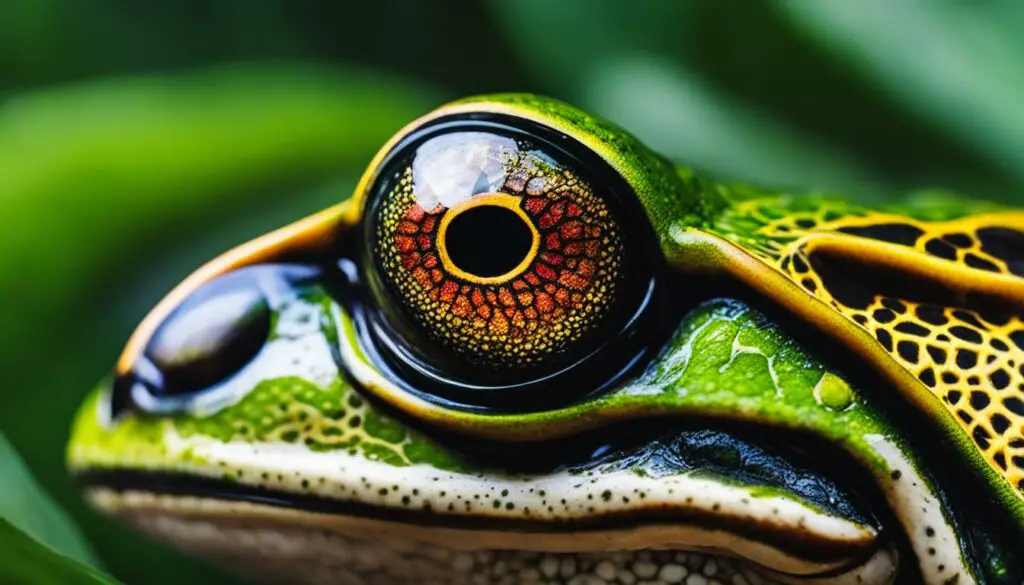
Frogs are rich in symbolism and their meaning can vary across cultures. They are often seen as symbols of transformation, rebirth, and renewal, as they undergo a remarkable metamorphosis from tadpoles to adults. Frogs are also associated with fertility and are often seen as messengers between the physical world and the spiritual realm.
In different cultures, frogs have been associated with good luck, prosperity, and abundance. They are considered to be harbingers of positive change and are seen as symbols of resilience, creativity, and determination.
The Spiritual Meaning of Frogs
The spiritual meaning of frogs is deeply rooted in their ability to transform and adapt to different environments. Just as a frog transitions from an aquatic life as a tadpole to a terrestrial life as an adult, it symbolizes the power of change and the need to embrace new beginnings.
“The frog symbolizes our ability to navigate through life’s transitions and embrace transformation.”
In many spiritual traditions, frogs are seen as connectors between the physical and spiritual realms. They are believed to possess innate wisdom and are considered to be messengers from the spirit world. By encountering a frog, it is believed that one can gain insight, guidance, and spiritual gifts.
Furthermore, frogs are associated with abundance and prosperity in many cultures. They symbolize the fertility of the earth and its ability to provide for all living beings.
| Culture | Symbolism |
|---|---|
| Egyptian | Fertility and renewal |
| Chinese | Wealth and prosperity |
| Native American | Transformation and rain |
| Japanese | Good luck and abundance |
The Power of the Frog Symbol
The symbolism of frogs is not limited to a specific culture or belief system. Across different societies, frogs are revered for their ability to adapt and thrive in diverse environments. They serve as reminders to embrace change, stay resilient, and tap into our creative potential.
Whether viewed as spiritual guides, symbols of good luck, or representations of transformation, frogs play a significant role in shaping our understanding of the world and our place within it.
Frog Symbolism in Different Cultures
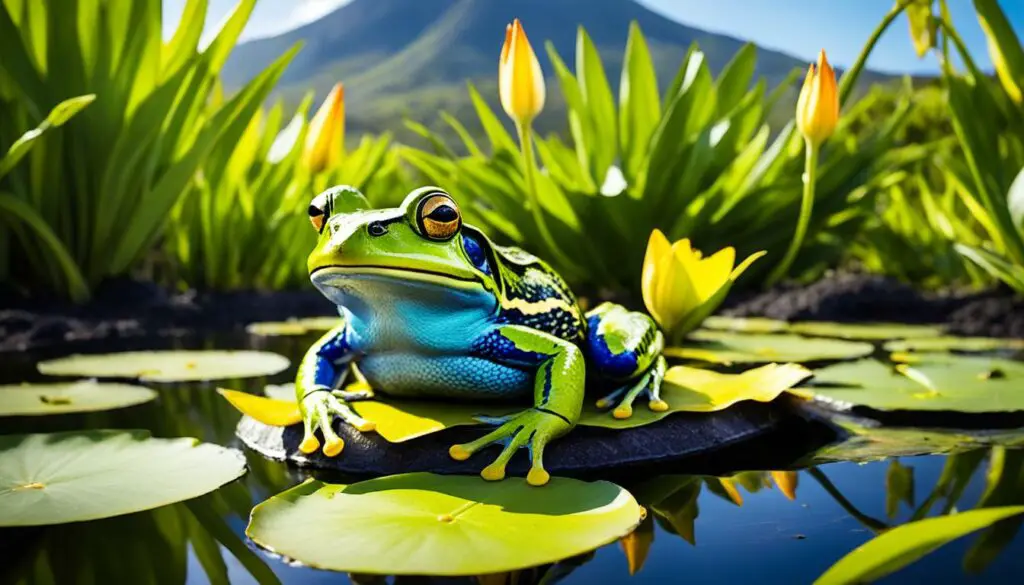
The symbolism of frogs varies across different cultures, showcasing the diverse interpretations and beliefs associated with these remarkable amphibians.
Japanese Culture:
In Japanese culture, frogs are highly regarded and believed to bring wealth, abundance, and good fortune. They are considered to possess magical powers and are seen as spiritual intermediaries.
Ancient Egypt:
Ancient Egyptians revered frogs as symbols of fertility, renewal, and the element of water. The frog-headed goddess Heket was worshipped as the bringer of fertility and abundance.
Chinese Culture:
In China, the Three-Legged Money Frog holds great significance. It is considered a powerful symbol of wealth, prosperity, and good fortune. Many households display statues or images of this frog as a good luck charm.
These cultural beliefs highlight the diverse meanings attributed to frogs in different societies, emphasizing their symbolic power and association with positive outcomes.
Frog Superstitions and Spiritual Meaning
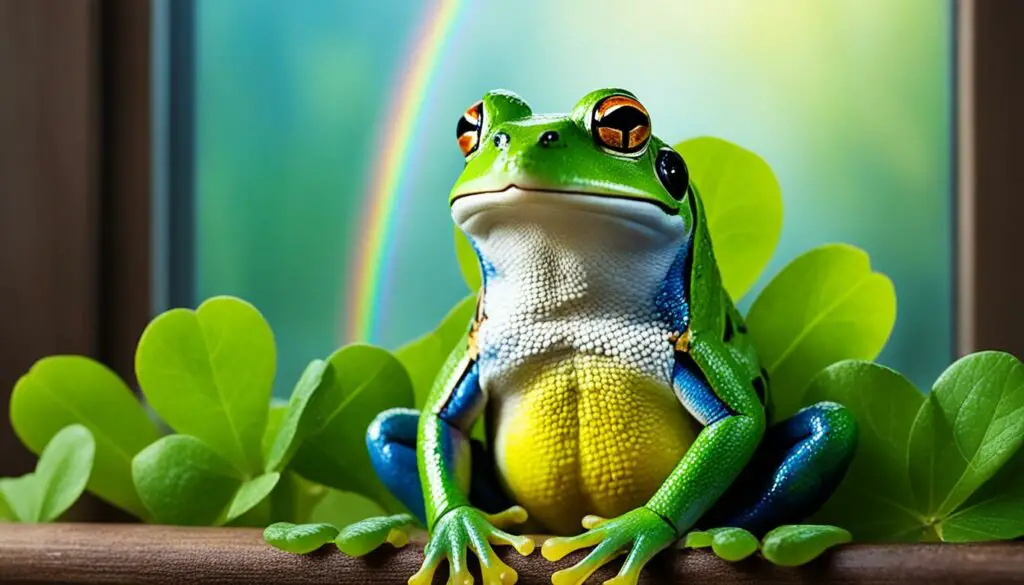
Frogs have long been associated with various superstitions and spiritual beliefs. These beliefs vary across cultures and can range from associating frogs with good luck and abundance to associating them with danger and ill fortune. The spiritual meaning of frogs often symbolizes transformation, personal growth, and the need for cleansing and purification.
In some traditions, encountering a frog is believed to bring good luck and abundance. The presence of a frog is seen as a positive sign, indicating that positive changes are on the horizon. In other superstitions, frogs are believed to be a warning of danger, reflecting a belief that encountering a frog may bring bad luck.
In spiritual contexts, frogs are often viewed as symbols of transformation and rebirth. Just as a frog undergoes a remarkable metamorphosis from a tadpole to an adult, it represents the potential for personal growth and change. The presence of a frog in one’s life may signify the need to let go of negativity, embrace change, and embark on a journey of personal transformation.
“Like the frog that transforms from a tadpole to an adult, we too have the power to undergo personal growth and transformation.”
Frogs are also associated with the cleansing and purification of one’s spiritual and emotional state. Their presence can remind us to release negativity and embrace positivity, fostering a sense of renewal and rejuvenation.
Frog Superstitions
Throughout history, frogs have been the subject of numerous superstitions. Here are a few examples:
- It is believed that touching a frog’s head can bring good luck and fortune.
- In some cultures, the sound of a frog’s croaking is believed to predict rain and abundance.
- It is considered unlucky to kill a frog, as it is believed to bring bad luck and misfortune.
- Some believe that having a frog jump into your house is a sign of impending good luck or the arrival of a visitor.
The Spiritual Meaning of Frogs in Different Cultures
In different cultures, frogs hold unique spiritual meanings. Here are a few examples:
| Culture | Frog Symbolism |
|---|---|
| Native American | Frogs are seen as messengers of rain and symbols of transformation. |
| Ancient Egypt | Frogs are revered as symbols of fertility, renewal, and the element of water. |
| Chinese | The Three-Legged Money Frog is considered a symbol of wealth, prosperity, and good fortune. |
Frogs play a significant role in superstitions and hold deep spiritual meaning across cultures. Whether seen as a harbinger of good luck or a symbol of transformation, the presence of a frog can invite reflection and inspire positive change in one’s life.
Frog Symbolism in Dreams

Dreams about frogs can hold significant symbolic meaning. When you dream about frogs, it can indicate a variety of interpretations and messages that resonate with your subconscious mind. Understanding the symbolism behind these dreams can provide valuable insights into your personal growth and life journey.
Transformation and New Beginnings: Seeing a frog in a dream is often associated with transformation and new beginnings. Just like a frog undergoes a metamorphosis from a tadpole to an adult, your dream about frogs may signify a period of change and personal growth in your waking life.
Harmony and Balance: Dreams about frogs inside the house may suggest the need for balance and tranquility within your home environment. It can serve as a reminder to create a harmonious space that nurtures your well-being and promotes a sense of peace.
Fertility and Abundance: If you dream of a green frog, it could symbolize fertility and abundance. This dream may indicate that you are entering a phase of creativity, growth, or the potential for new opportunities and abundance in various aspects of your life.
Adaptability and Resilience: Dreaming of frogs jumping on you may suggest the need for adaptability and resilience in the face of challenges. It could indicate that you have the strength and flexibility to overcome obstacles and navigate through difficult situations, just as frogs move swiftly and gracefully.
Conflict and Challenges: In some instances, dreaming of a frog attacking you or dreaming of frogs and snakes may represent challenges or conflicts in your life. These dreams may indicate the presence of negative influences or unresolved issues that require your attention and resolution.
Spiritual and Biblical Meanings: The spiritual and biblical meanings of frogs in dreams can vary. However, they are often associated with spiritual transformation, cleansing, and renewal. In some religious contexts, frogs symbolize the need for repentance, purification, and spiritual enlightenment.
Overall, dreams about frogs hold significant symbolism and can provide valuable insights into your personal and spiritual journey. Paying attention to these dreams and reflecting on their meanings can offer guidance and inspiration as you navigate through life’s transitions and challenges.
Frog in Your Garden: Sign of a Healthy Ecosystem
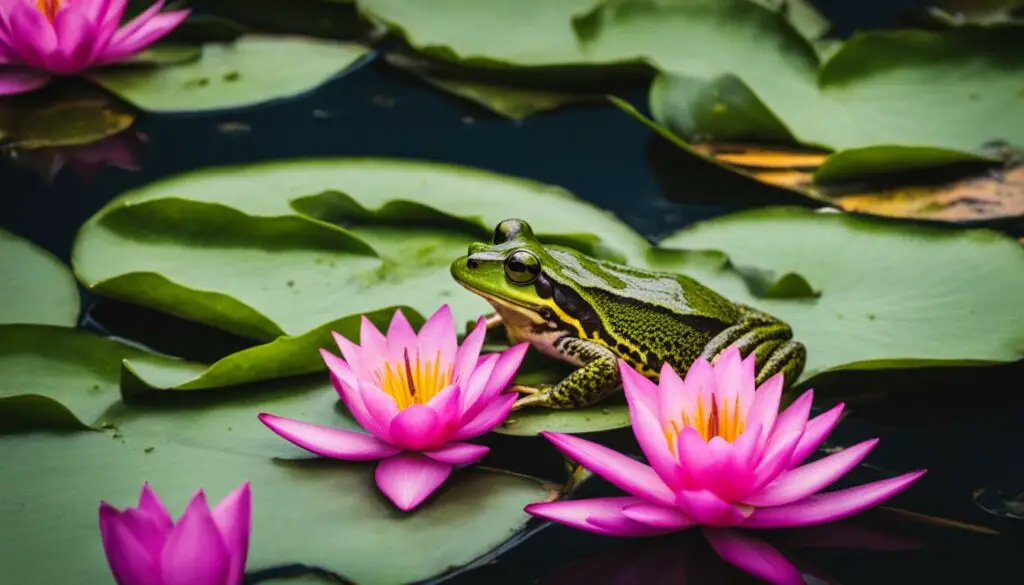
Having frogs in your garden is often seen as a positive sign of a healthy ecosystem. Frogs are bioindicators, meaning their presence indicates a balanced and thriving environment. Their presence in your garden can indicate good environmental health and biodiversity. In many cultures, frogs in the garden are seen as a symbol of prosperity and good luck, as they are associated with abundance and fertility.
Frogs play a crucial role in maintaining a healthy garden ecosystem. They act as natural pest controllers, feeding on insects that can damage your plants. By keeping insect populations in check, frogs help maintain the ecological balance in your garden without the need for chemical pesticides.
Furthermore, frogs contribute to nutrient cycling by consuming smaller organisms and releasing nutrients through their waste. This process enriches the soil and promotes plant growth.
Having a diverse range of flora and fauna in your garden is essential for creating a harmonious environment. Frogs, with their unique characteristics and role in the ecosystem, add diversity and contribute to the overall biodiversity of your garden.
By creating a welcoming habitat for frogs, such as providing water sources like ponds or small pools, and incorporating native plants, you can encourage their presence in your garden. This not only enhances the ecological value but also creates a peaceful and tranquil atmosphere.
“The presence of frogs in your garden is a testament to the health and balance of your ecosystem. Embrace their presence and cherish the natural abundance they bring.”
So, the next time you spot a frog hopping around your garden, consider it as a positive sign. It signifies that your garden is thriving, and you are providing a suitable habitat for these fascinating and beneficial creatures.
Frog in Your Home: Balance and Positive Change

When a frog enters your home unexpectedly, it is often seen as a symbol of balance and positive change. Just as frogs can live both on land and in water, their presence indoors symbolizes the need for equilibrium in your daily life. It can be a reminder to create a sense of balance and tranquility within your home environment. Some beliefs also associate indoor frog sightings with unexpected wealth or a positive change on the horizon.
Embrace the presence of a frog in your home as a divine message to restore harmony and find stability in your life. Take this opportunity to assess your surroundings and make any necessary adjustments to create a peaceful and balanced atmosphere. Just like the frog effortlessly transitions between water and land, strive to find a balance between work and personal life, responsibilities and leisure, and physical and mental well-being.
Allow the presence of a frog in your home to guide you towards positive change. Embrace any opportunities that come your way and trust that they will lead you to a greater sense of fulfillment and prosperity. Just as the frog symbolizes transformation and rebirth, allow this unexpected visitor to inspire personal growth and encourage you to step outside of your comfort zone.
Additionally, the frog’s presence reminds us to maintain a sense of adaptability and resilience in the face of change. When encountering challenges, remember that the frog perseveres through various stages of its life cycle, adapting to different environments. This resilience can serve as a source of inspiration and motivation as you navigate through life’s ups and downs.
In summary, a frog in your home signifies the need for balance, positive change, and adapting to new situations. Embrace the message it carries and use it as an opportunity to create a harmonious and tranquil living space. Let the frog be a reminder to remain open to new possibilities and maintain a resilient spirit in pursuit of personal growth and prosperity.
Cultural Beliefs and Frog Symbolism
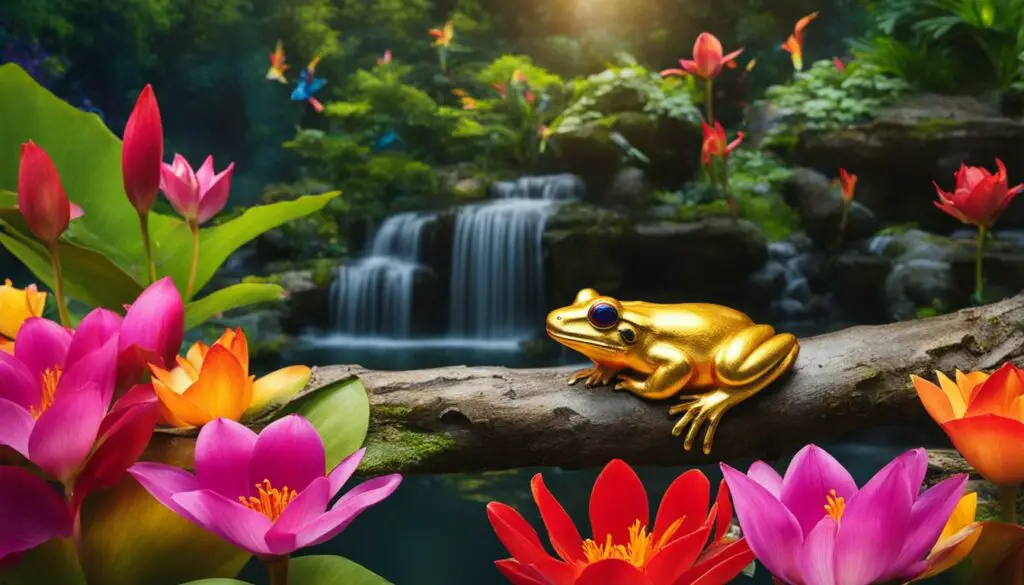
Frogs hold significant meaning and symbolism in various cultures and traditions around the world. Let’s explore how frogs are perceived and revered in different societies:
Ancient Egypt
In ancient Egypt, frogs were closely associated with fertility and renewal. They were considered sacred animals that symbolized the life-giving powers of the Nile River. The frog-headed goddess Heket, often depicted with the head of a frog, was worshipped as the bringer of fertility and abundance.
Native American Folklore
In Native American folklore, frogs were regarded as messengers of rain and symbols of transformation. They were believed to possess the power to call rain and bring about life-giving showers to nourish the earth. Frogs were seen as powerful symbols of change and renewal.
Chinese Culture
In Chinese culture, the Three-Legged Money Frog, also known as the Chan Chu or Jin Chan, is highly revered as a symbol of wealth, prosperity, and good fortune. It is often depicted sitting on a pile of coins, holding a Chinese coin in its mouth. The Three-Legged Money Frog is believed to attract wealth and abundance into the home or business.
The diverse interpretations and symbolisms of frogs across different cultures highlight their significance as creatures with deep-rooted cultural beliefs. Whether representing fertility and renewal, serving as messengers of rain and transformation, or symbolizing wealth and prosperity, frogs continue to captivate our imagination and hold a special place in our cultural heritage.
Spiritual Significance of Frogs in Mythology and Folklore
Frogs hold a prominent presence in mythology and folklore around the world. Their symbolism transcends cultural boundaries, encompassing themes of transformation, rebirth, and renewal. In numerous ancient and contemporary cultures, frogs are revered as spiritual beings that bridge the gap between the physical world and the spiritual realm.
Within different cultures, frogs are often seen as messengers, carrying the spiritual essence of departed ancestors and connecting the living to their lineage. Their presence is believed to bring comfort, guidance, and protection. Moreover, frogs are associated with healing powers and are believed to possess the ability to bring luck and prosperity to households.
The symbolism attributed to frogs may vary among cultures, yet they frequently serve as spiritual guides, urging individuals to embrace positive change and personal growth. Their adaptable nature and ability to transition between land and water epitomize resilience and balance in the face of life’s challenges.
“Frogs are spiritual beings… shedding light on the transformative and regenerative aspects of the human experience.” – Shamanic practitioner
Frogs in Native American Mythology
In Native American folklore, frogs hold significant meaning and are often associated with transformation, rain, and fertility. They are seen as symbols of natural cycles and the interconnectedness of all living beings. Various tribes attribute different meanings to frogs, but they commonly embody adaptability, purification, and the ability to cleanse and renew.
Frogs in Chinese Culture
In Chinese culture, frogs have long been regarded as symbols of good luck, wealth, and abundance. The Three-Legged Money Frog, also known as the Jin Chan, is a popular charm believed to bring prosperity and financial fortune. The frog’s association with water further emphasizes its connection to wealth and the flow of abundance.
| Culture | Frog Symbolism |
|---|---|
| Egypt | Renewal, fertility, and connection to the element of water |
| Japan | Wealth, abundance, and good fortune |
| Native American | Transformation, rain, fertility, adaptability, and purification |
| China | Wealth, prosperity, and financial fortune |
Regardless of cultural variations, the symbolism of frogs remains consistent in highlighting their significance as spiritual guides and catalysts for positive change. Whether encountered in dreams, gardens, or homes, frogs serve as reminders of the transformative power of growth, renewal, and the need for harmony in our lives.
Conclusion
Frogs hold diverse symbolism and cultural significance across different traditions. They are commonly associated with transformation, rebirth, fertility, and good fortune. The presence of a frog in your house can be seen as a positive sign of luck and abundance, as well as a symbol of personal growth and the need for balance in your life. In many cultures, encountering a frog is believed to bring good luck and is considered a fortunate omen.
Frogs are also significant in dreams, representing transformation and renewal. Dreaming of frogs can symbolize new beginnings and personal growth. Their presence can indicate the need for adaptability, resilience, and the embrace of positive change.
Whether you find a frog in your garden or inside your home, it serves as a reminder of the interconnectedness of nature and the potential for positive change in your life. Frogs are believed to be messengers between the physical world and the spiritual realm, connecting the living to their departed ancestors. Embracing the symbolism of frogs can bring a sense of balance, harmony, and prosperity to your life.
FAQ
Is a frog in the house good luck?
Seeing a frog in your house is often interpreted as an omen of good luck and can symbolize that things are going well and according to plan. In many cultures, frogs are believed to bring good fortune and abundance.
What is the symbolism of frogs?
Frogs are rich in symbolism and are often associated with transformation, rebirth, and renewal. They can also represent fertility, resilience, determination, and creativity.
What is the symbolism of frogs in different cultures?
The symbolism of frogs varies across different cultures. In Japanese culture, frogs are believed to bring wealth and good fortune. In ancient Egypt, they were associated with fertility and renewal. In China, the Three-Legged Money Frog is considered a symbol of wealth and prosperity.
What are the superstitions and spiritual meanings of frogs?
Frogs are believed to bring good luck and abundance in some traditions. In spiritual contexts, they symbolize transformation, personal growth, and the need for cleansing and purification.
What is the symbolism of frogs in dreams?
Seeing a frog in a dream can symbolize transformation, new beginnings, and personal growth. Dreams about frogs inside the house may suggest the need for balance and tranquility. Different dream scenarios, such as frogs jumping on you or frogs and snakes together, may indicate adaptability, resilience, or challenges in your life.
What does it mean to have frogs in your garden?
Having frogs in your garden is often seen as a positive sign of a healthy ecosystem. Frogs are bioindicators and their presence indicates a balanced and thriving environment. In many cultures, frogs in the garden symbolize prosperity and good luck.
What does a frog in your home symbolize?
When a frog enters your home unexpectedly, it is often seen as a symbol of balance and positive change. It can represent the need for equilibrium in your daily life and may even be associated with unexpected wealth or a positive change on the horizon.
What is the cultural significance of frogs and their symbolism?
Frogs hold significance in various cultural beliefs and traditions. In ancient Egypt, they were associated with fertility and renewal. In Native American folklore, frogs were seen as messengers of rain and symbols of transformation. In Chinese culture, the Three-Legged Money Frog is considered a symbol of wealth and prosperity.
What is the spiritual significance of frogs in mythology and folklore?
Frogs have a prominent presence in mythology and folklore worldwide. They are often associated with transformation, rebirth, and renewal. They are sometimes seen as messengers between the physical and spiritual realms, bringing luck, prosperity, and healing.
What is the conclusion about frogs as a symbol of luck?
Frogs hold diverse symbolism and cultural significance, representing good luck, abundance, balance, and positive change. Whether encountered in dreams, gardens, or homes, frogs serve as reminders of the potential for growth and the interconnectedness of nature.
